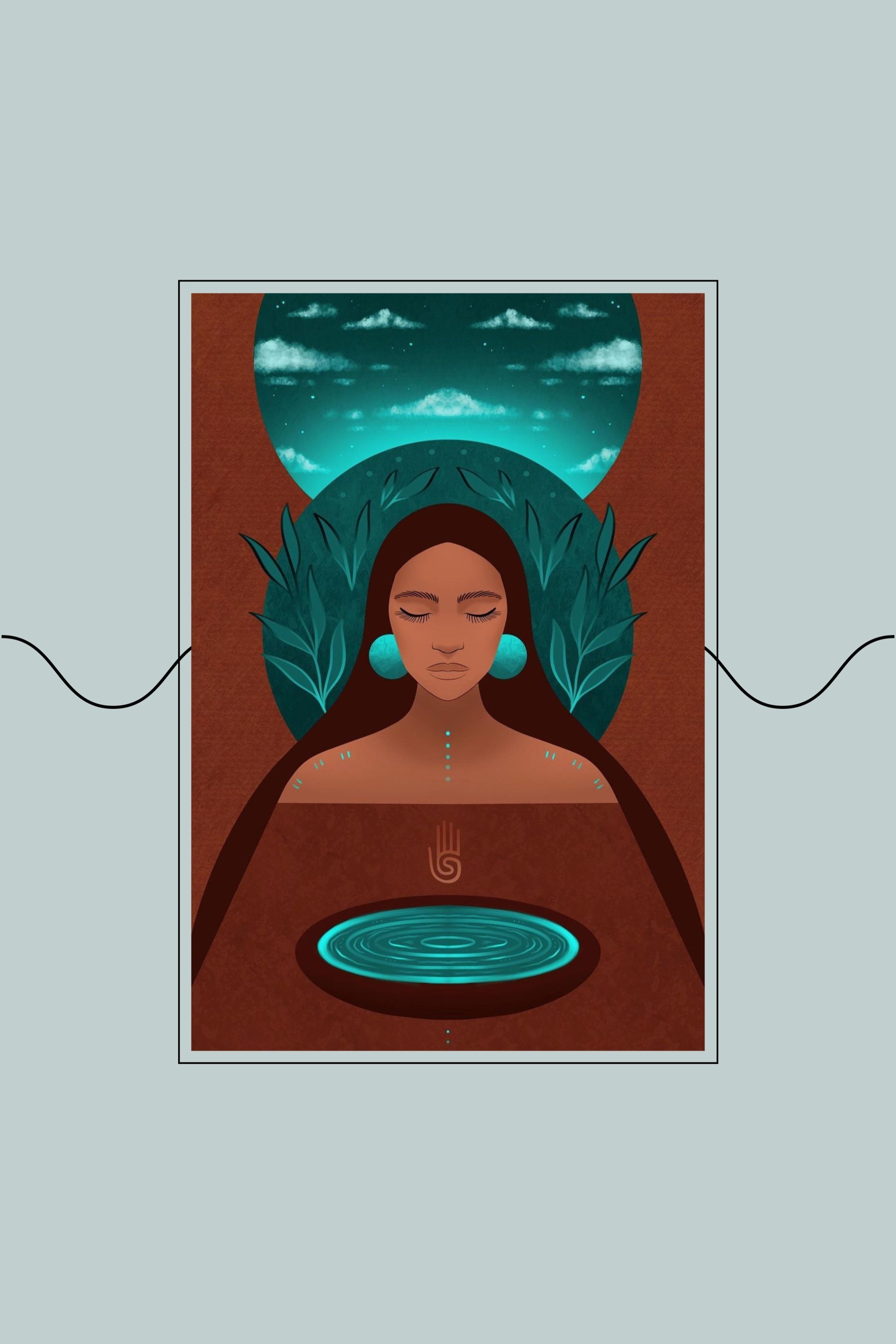Ancestral Healing: A Practical Guide
W&S Health and Wellness Editor
SHARE ON:
DISCLAIMER: Please consult a qualified healthcare professional before starting any new wellness regimen. Always seek the advice of your physician or other qualified health provider with any questions you may have regarding a medical condition or well-being concerns. Never disregard professional medical advice or delay in seeking it because of information provided in this article. The content is for informational purposes only and should not be considered a substitute for professional medical advice, diagnosis, or treatment. Always consult with your healthcare provider to address any health concerns you may have. Before reading the following content, we also suggest reading our full disclaimer statement here.
Some of the links on this post might contain affiliate links. If you use any of these links to buy something we may earn a commission. For more information, please check out our disclosure statement. Thanks so much for supporting our free content!
We saw this amazing TikTok from @sanela.estrella (check out her content!) and got inspired to make this article about the importance of ancestral healing.
@sanela.estrella & forgive your parents for not knowing how to heal their own wounds to prevent them from projecting them onto you. #shadowwork #ancestralhealing #generationaltrauma #spiritualtiktok #witchtok ♬ In The Forest (Acoustic Indie No Copyright) - Instrumental - Lesfm & Olexy
There is much to be said about the transformative journey of ancestral healing. Ancestral healing has been hailed by many as an invaluable tool for unraveling the threads of our collective past. In a world resonating with the echoes of generational trauma, understanding the complex dimensions of ancestral healing becomes enticing.
Such an exploration is not a passive glance into history, however, but a conscious effort to navigate relational complexities, confront unexplained emotional triggers, and engage in the profound act of forgiveness. Join us as we delve into the realms of spirituality, psychology, and their interconnectedness to unveil the role of ancestral healing in reshaping our narratives and forging a new path to collective well-being.
In this Article
Not ready to read through just yet? No problem, save it on Pinterest!
Ancestral Healing: Origins and Lineages
Embarking on the transformative journey of ancestral healing requires a profound understanding of its origins and significance. The modern concept of "ancestral healing" draws directly from ancient practices deeply rooted in long-held cultural and spiritual traditions around the world. Historically, indigenous communities worldwide have engaged in rituals and ceremonies to honor their ancestors, recognizing the spiritual thread that connects generations.
In African, Native American, and various Asian traditions, rituals for communicating with ancestors have also been pivotal. These practices acknowledge the spiritual continuity that binds the living and the dead. For instance, in the Yoruba culture of Nigeria, ancestral veneration is central to their belief system. The Yoruba people perform elaborate ceremonies, such as Egungun festivals, where they communicate with their ancestors through dance, music, and ritualistic performances. Ancestor worship is not only a spiritual practice but also a way to seek guidance and blessings for the community.
Among the Native American tribes, such as the Sioux, ancestral connections are integral to their spiritual fabric. The Sioux engage in the belief of the Wankan Tanka, where they seek harmony with the spirits of their forebears. Through rituals involving sacred objects and chants, they maintain a connection with their ancestral roots, fostering a sense of identity and continuity.
In various Asian cultures, like the Chinese, ancestor veneration is a deeply ingrained tradition. The Chinese celebrate Qingming Festival, also known as Tomb-Sweeping Day, where families visit the graves of their ancestors, clean the burial sites, and make offerings. This act of remembrance and reverence strengthens familial bonds and ensures a spiritual link between past and present.
These examples illustrate the diverse ways in which cultures globally embrace ancestral healing through spiritual practices. The rituals and ceremonies serve not only as a means to honor the past but also as a source of guidance, wisdom, and a profound connection to one's roots.
Wondering why you’re seeing ads? Check out our Disclosure Policy.
Ancestral Healing vs. Generational Trauma
Ancestral healing operates as a spiritual counterpart to the psychological concept of generational trauma. The concept of generational trauma, deeply explored in the field of psychology and sociology, encapsulates the transmission of adverse experiences, stressors, and psychological effects across successive generations. Rooted in the seminal work of scholars such as Dr. Rachel Yehuda, a neuroscientist and psychiatrist, and Dr. Vincent Felitti, co-founder of the Adverse Childhood Experiences (ACE) study, says generational trauma is intricately linked to the understanding of epigenetics.
Studies, like those conducted by Dr. Moshe Szyf and Dr. Meaney, have illuminated the biological mechanisms by which trauma can leave lasting imprints on the epigenome, influencing gene expression and potentially impacting the mental and emotional well-being of descendants. Historical events, exemplified by the Holocaust and documented through the works of researchers like Dr. Daniel Bar-On, showcase the transgenerational effects of trauma, with survivors and their offspring exhibiting heightened vulnerability to stress-related disorders. In Indigenous contexts, scholars such as Dr. Maria Yellow Horse Brave Heart have extensively studied historical trauma, elucidating its pervasive influence on Native American communities.
Ancestral healing might look like taking part in traditional festivals and ceramonies, as seen by @sincerelyjules above celebrating Día de Muertos.
The concept extends beyond individual traumas, considering systemic oppression and cultural dislocation, as observed in the works of Dr. Eduardo Duran, a clinical psychologist of mixed heritage. Collectively, these interdisciplinary studies underscore the complex interplay of genetics, environment, and cultural factors in the transmission of trauma across generations, shaping the discourse on mental health and resilience on a global scale.
“
Generational trauma manifests in myriad ways, echoing the pain of historical injustices and family struggles through the ages.
Generational trauma manifests in myriad ways, echoing the pain of historical injustices and family struggles through the ages. For communities of color, this trauma might be deeply rooted in the historical scars of slavery, colonization, or forced displacement. It reverberates through systemic inequalities, racial injustice, and the enduring impact of cultural erasure. Ancestral healing emerges as a profound response, offering a spiritual toolkit to address the multifaceted dimensions of generational trauma.
In other words, while generational trauma focuses on the psychological impact of historical events on individuals and their descendants, ancestral healing delves into the spiritual dimensions of this intergenerational transfer of pain. It's crucial to recognize that these concepts are not mutually exclusive; rather, they offer complementary perspectives on the complex tapestry of our shared past.
Wondering why you’re seeing ads? Check out our Disclosure Policy.
Ancestral Healing: The Role of Spirituality in Unravelling Generational Trauma
Researchers and trauma advocates such as Dr. Jennifer Mullan and Eden Teng, for instance, are very vocal about the importance of recognizing the relationship between ancestral healing in addressing generational trauma. Many BIPOC Americans identify as religious and/or spiritual. As such, healing approaches catered to these groups must be sensitive to this reality as much as the realities of the racialised American experience.
According to Dr. Mullan “our current approach to mental health is steeped in colonialism”. Her observations of how this is so always includes the common failure of established, popular psychology to account for multi-generational impacts of racism in treatment, for instance. Teng, speaking to NPR, reaffirms Mullan’s views with her own personal experience of how when studying psychology she “felt that so much of [her] family's history just didn't feel like it was considered”.
Regardless of how one feels about spirituality and religion politically or as broader concepts, it is important to acknowledge the merit of developing healing approaches and emotional treatment that works for the patient. This sort of patient-first care is considered by many in the medical and professional mental health field as paramount in creating lasting change in someone’s well-being. Moreover, scientific studies have explored the positive impact of ancestral healing practices on mental health, showing a correlation between cultural connectedness and well-being.
If this is true, the current status of popular therapy lacking nuanced approaches to healing generational trauma is not reflective of these findings. While it certainly is not a catch-all solution, there is a possibility that ancestral healing can be a useful avenue in the movement toward balancing out the often one-dimensional perceptions around BIPOC well-being in the West. By engaging in rituals, ceremonies, or practices that connect with ancestral spirits, individuals may find solace, guidance, and a renewed sense of purpose.
Wondering why you’re seeing ads? Check out our Disclosure Policy.
Ancestral Healing: Dissecting Your Ancestral Tree
The foundational step on the ancestral healing journey involves embarking on a profound exploration of one's roots, an odyssey into the annals of family history. Beyond the conventional notion of sifting through dusty archives and digital databases, this process encompasses a dynamic interplay of both recorded and oral histories.
Delving into genealogical records is the typical initiation of unraveling your family's narrative. Online platforms, historical documents, and archives can illuminate the branches of your family tree. Understanding lineage provides a poignant context for the cultural, social, and historical forces that have shaped your identity. While the journey of researching family history is a universally enriching pursuit, certain communities may face unique challenges and considerations.
For many Black Americans, tracing family roots can be a complex endeavor due to the historical legacy of slavery, which often disrupted and erased familial connections. Despite the challenges, the exploration of genealogy can be a powerful act of reclaiming identity and resilience. Resources like the Freedmen’s Bureau records and DNA testing services have provided breakthroughs for individuals seeking to reconnect with their African heritage. Each discovery, no matter how small, contributes to a broader understanding of one's personal narrative.
Asian Americans and Native Americans may encounter complications rooted in cultural hesitancies or historical disruptions. Asian cultures, often characterized by oral traditions, might find it challenging to navigate written archives. Similarly, Native American communities, who have experienced forced relocations and cultural suppression, may approach genealogical research with caution. Sensitivity to these cultural nuances is crucial, and collaborative efforts with tribal communities can provide insights into family histories while respecting communal boundaries.
It is very common women of color living in the West to feel disconnected from their lineage due to not speaking in their cultural language. Ancestral healing can be a useful tool in coming to terms with this. As explained by @drsabreena_gs above, “My academic eloquence in English may have cost me the same in my mother tongue, but my heart and soul still speak only in my ancestral languages.”.
Practical steps are essential for anyone embarking on this journey. Start by visiting local archives and libraries, establishing connections with knowledgeable librarians who can guide your search. Court records can be valuable sources, and individuals can inquire about accessing documents concerning non-living relatives. Many churches keep detailed records, offering insights into births, marriages, and deaths. Engaging with clergy members can facilitate access to these records. Additionally, online platforms, such as Ancestry.com, provide extensive databases and tools for constructing family trees. DNA testing services like 23andMe and offer a scientific dimension to genealogical exploration. By combining these practical steps with cultural sensitivity, individuals can embark on a rewarding journey of uncovering their family's intricate tapestry, bridging the gaps of time and understanding the diverse forces that have shaped their heritage.
Importance of Oral Histories
However, ancestral healing is not a mere archival expedition; it's a holistic venture that involves reaching out to living repositories of familial knowledge—your relatives. Engaging in conversations with family members, particularly older generations, offers invaluable insights. Their memories, anecdotes, and experiences enrich the narrative in ways that official documents may not capture. According to Pew Research, for instance, Black adults, especially Black women, are more likely than any other group to seek out their family histories orally.
Such a fact might be attributed to the historical exclusion of Black Americans from public institutions that made the practice not just common, but vital to keeping family histories afloat. For marginalized women, whose histories have often been relegated to the periphery of formal archives, oral histories become a critical source. The stories, struggles, and triumphs embedded in the spoken narratives of grandmothers, aunts, and elders hold a unique significance. These oral histories, transmitted through generations, encapsulate a resilience that might otherwise be obscured in the official record.
Let’s face it— hearing stories about your great grandparents from your grandparents about what they experienced, felt, and desired is exceedingly more personal and intimate than anything you could get from an official archive. Ancestral healing, therefore, necessitates a conscious effort to uncover and amplify these stories. It's an acknowledgment of the strength embedded in the tales of survival, cultural preservation, and resistance passed down through generations.
Wondering why you’re seeing ads? Check out our Disclosure Policy.
As we meticulously dissect the family tree, let us recognize the dual nature of this exploration—one that involves both the tangible records and the intangible narratives. The whispers of lived experiences, once amplified, can reverberate through the corridors of time, fostering a deeper conne
Follow us on
Pinterest:
Ancestral Healing: Understanding the Role of Forgiveness and Non-Judgement
Embarking on the intricate journey of ancestral healing is akin to opening a multifaceted time capsule, revealing layers of generational narratives, some of which may be difficult to digest. As we navigate this intricate terrain, it's imperative to recognize the potential triggers and emotional upheavals that may arise from uncovering the past.
Navigating Emotional Triggers
Research has shown that engaging with ancestral trauma can evoke profound emotional responses. Studies conducted by Dr. Daniel Schechter, a leading researcher in the field of intergenerational trauma, underscore the intricate nature of emotional triggers. Schechter's work reveals that the examination of family histories can activate neural networks associated with heightened stress responses, emphasizing the importance of understanding the neurological impact of such triggers.
Understanding Choices and Motivations
To truly grasp the depth of ancestral healing, one must confront the dissonance between contemporary values and the decisions made by ancestors in different historical contexts. Research from the fields of epigenetics and psychology, such as the work of Dr. Rachel Yehuda, a pioneer in the study of intergenerational trauma, underscores how traumatic experiences can influence decision-making across generations. Yehuda's research delves into the molecular mechanisms that transmit stress effects across generations, highlighting the importance of approaching ancestral actions with an empathetic lens and acknowledging the complex interplay of historical circumstances.
Practicing forgiveness and non-judgment aligns with findings from studies on psychotherapy and trauma recovery. Dr. Fred Luskin's work on forgiveness emphasizes its therapeutic benefits, linking forgiveness to reduced stress and improved mental well-being. Luskin's research delves into the psychological processes involved in forgiveness, highlighting its potential to alleviate the emotional burden associated with ancestral trauma.
Wondering why you’re seeing ads? Check out our Disclosure Policy.
Facing the Past for a Better Future
Psychological studies, including those by Dr. Dan McAdams on narrative identity, emphasize the significance of integrating the entire spectrum of one's personal and familial history. McAdams' research explores how the construction of life narratives contributes to a sense of identity and personal meaning. Running away from discomfort or unpleasant truths, as observed in research on avoidance coping strategies by Dr. John Ruscio and others, can impede personal growth and hinder the transformative potential of ancestral healing.
As we delve deeper into the shadows of the past, we acknowledge the discomfort and commit to an informed and compassionate exploration. In doing so, we not only honor the complexity of our ancestral narratives but also pave the way for a more enlightened and interconnected future.
Ancestral Healing: The Bottom Line
As we conclude this exploration into ancestral healing, we embrace the wisdom that emanates from understanding our roots. The intricate dance of forgiveness and non-judgment, the delicate art of navigating emotional triggers, and the profound impact of our familial choices all contribute to the tapestry of our existence. By dissecting our family tree and comprehending the intricate web of our past, we pave the way for a more conscious and compassionate future. The journey does not end with the last chapter of our family history; it extends into the uncharted territories of our evolving narratives. May this endeavor empower you to embrace the wisdom of your ancestors and illuminate the path to healing for generations yet to come.
Also, feel free to check out some of our curated conscious living and well-being resources:
Wondering why you’re seeing ads? Check out our Disclosure Policy.












